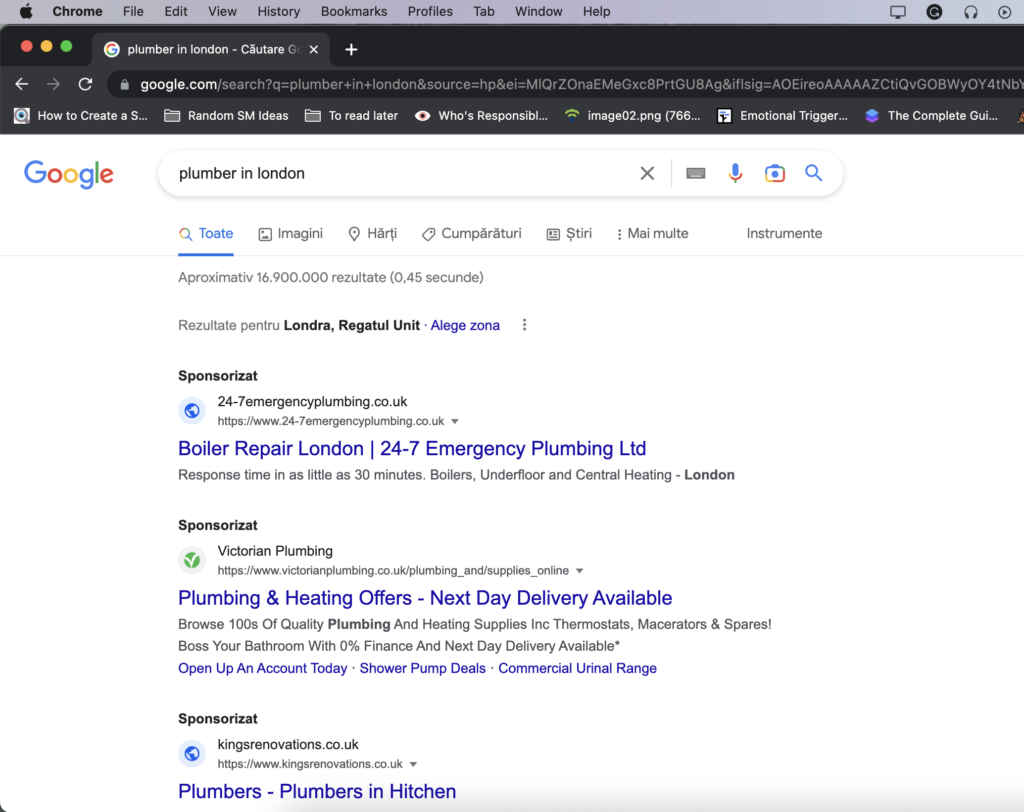
According to MOZ, almost half of the two trillion searches that happen every year on Google are local queries. In other words, local searches account for about one trillion searches on Google. So if you're running a local business and you're not tapping local landing pages for SEO, you're leaving opportunity on the table.
In this article, we're taking a closer look at local SEO, why local landing pages for SEO are so important, and how to create localized seo landing pages that work as a pillar for your organic visibility strategy
First things first: why local SEO is important. This is more than just your Google My Business profile.
As briefly pointed in the introduction, one trillion searches on Google are related to local queries. This includes searches like:
...And other similar queries, made by people like you and I, looking for local businesses or services to meet their needs. Local SEO can help you:
All in all, if you're running a local business (or a nationwide one with local stores), optimizing for local SEO can be an extremely effective way to boost conversions and acquire new customers.
Simply put, local SEO landing pages are web pages created to target specific local areas and show up in the SERPs (search engine results pages) when someone searches for something related. For instance, if someone is looking for a "plumber in Eisehscmitt, Germany" and you have a local SEO page optimized for "the best plumber in Eisenschmitt," your page will likely appear in SERPs. This can be applied for B2B and B2C businesses and should not be thought of as a strategy destined for local home services or local businesses only.
SEO landing pages are usually optimized around a target keyword (e.g., "the best plumber) plus the local area (e.g., "in Eisenschmitt.") If you run a nationwide plumbing business, you will most likely want to create local SEO landing pages for each of the locations in which you offer your plumbing services.

While landing pages optimized for local SEO are great, you don't need to optimize all of your landing pages for local searches. Local SEO techniques must be applied on a case-by-case basis, depending on your needs, the type of products/ services you sell, and the geo-location business area.
For instance, if you're a nationwide plumbing business with stores in multiple cities, then optimizing your landing pages for local SEO is a must. On the other hand, if you're running a small online business with no physical location, localizing your landing pages for SEO may or may not be needed.
The same can be applied to enterprise and SaaS businesses that offer their software and technology globally. If your goal is to rank in the US for the keyword “Software for marketing consultants,” then you may want to consider breaking down the ranking by cities. You can do this by creating unique landing pages optimized for long-tail geo-location keywords:
You may be asking: when does local SEO not work so well? Let’s say you provide digital marketing services for businesses in a specific area, local SEO pages will help. But if your business is targeting a specific location that isn’t in your business service area, local SEO won’t help.
Furthermore, not all landing pages are meant to be optimized for search engines. Sometimes, you may need to create a landing page for a specific PPC (pay-per-click) campaign, a product launch, or even an email campaign. These pages don't need to be optimized for SEO since they won't appear in the SERPs, and they will be used for a specific and often time-limited purpose.
This means that if you create these custom SEO landing pages you can use them as templates for multiple campaigns.
Building a local landing page is not rocket science. However, you will need to follow specific techniques to make sure your page outranks other websites targeting the same keyword in your area. Here are some of the most important best practices to follow when building local landing pages for SEO:
Good keyword research is the foundation of successful SEO, and it is no different when creating local landing pages. Make sure you use the correct keywords so that your page can be found by people searching for what you offer in the local area.
To make sure you rank for local searches, remember to include the name of your location (as well as potential alternatives). For instance, if your business is located in New York City" you may want to include the words "NYC" and "the Big Apple."
This is a small adjustment (it will only take a couple of minutes), but it can make all the difference in the world. Make sure to include your keyword and your location in your meta title and meta descriptions to help the search engine crawlers "read" your website and determine what it is about.
High-quality images have two main goals: they help you deliver the message to your readers and they can help you with your SEO. Optimizing alt-tags on images is another small, but frequently overlooked best practice that can help you get more organic traffic to your website.
Don't just slip your location name in your articles -- make them really close to your community, what they care about, what they like to do, etc. Local references can help you connect to your readers, make your business more convincing, and gain trust -- all elements that will help you convert more visitors into buyers.
If your business has a physical location, make sure to include a map that helps potential customers locate your store and find the best way to get there. Google Maps is one of the most popular tools to display maps on websites.
A large portion of those who look for businesses like yours in your area does it on a mobile phone. In fact, more than 60% of all searches come from mobile devices like phones and tablets. Given this context, you absolutely want to make sure your pages load quickly on mobile devices. Remember to:
This may not be an "SEO trick", but it will help you convert more of those who land on your website. Social proof (reviews, testimonials) can help you gain people's trust because we're "wired" to buy something when someone else says it's good. Intersperse review and testimonal snippets on your local landing pages for SEO and you'll get more people to actually contact you/ buy from you.
A clear call to action is essential for a successful website. Don't leave it up to the readers to figure out what you want them to do next -- be direct and tell them what you want them to do. A call to action should be prominent and placed where people won't miss it.
The last step is to assess your results. Monitor the performance of each page regularly and make adjustments if needed. If you track your performance, you'll be able to see which adjustments are working and which ones need improvement. Some metrics you could track include:
To conclude, local SEO landing pages can be used practically by any business that doesn’t have a sensitive area of service. This means if you can sell your product or service in a given location, you can optimize for local SEO landing pages, receive qualified traffic, grow your organic visibility, and set your business up with inbound revenue opportunities.
Local SEO is one of the most efficient, cost-savvy, and straightforward ways to generate organic traffic and leads. Keep the tips above in mind as you create content for your local landing pages, and you will reap all the benefits local SEO offers!
Implementing sustainable and scalable SEO systems can be daunting. Jason Pittock runs an elite SEO Coaching and Masterclass program that helps business and marketing professionals connect the systems, culture, and talent to scale SEO with their businesses and organizations. If you are interested in moving your business forward with SEO, contact Jason Pittock today to schedule a FREE SEO coaching call.